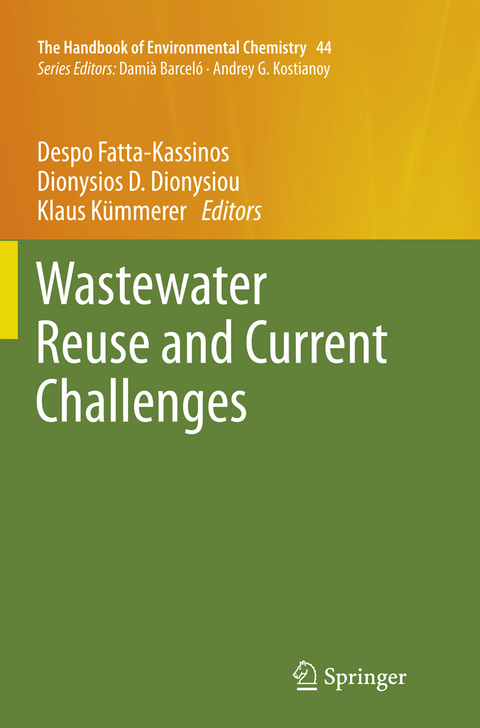
Wastewater Reuse and Current Challenges
Springer International Publishing (Verlag)
978-3-319-79546-1 (ISBN)
Scope of the Book Wastewater Reuse and Current Challenges.- New challenges for the analytical evaluation of reclaimed water and reuse applications.- Bioassays currently available for evaluating the biological potency of pharmaceuticals in treated wastewater.- Bioavailability and uptake of organic micropollutants during crop irrigation with reclaimed wastewater: Introduction to current issues and research needs.- Irrigation with treated wastewater: Potential impacts on microbial function and diversity in agricultural soils.- Antibiotic resistance elements in wastewater treatment plants: scope and potential impacts.- Safe drinking water?- Effect of wastewater inputs and source water impairment and implications for water reuse.- Wastewater use in agriculture and relevance of micropollutants in North African countries.- Design of water recovery system with process integration.- Water reuse within the paper industry.- Reusing landfill leachate within the framework of a proper management of municipal landfills.
"The book could be of interest to a wide audience, including analytical chemists and biochemists ... . Administrators, planners, and decision-makers could also be attracted by the contents of the book. The chapter presents and discusses the threats and challenges related to the direct reuse of reclaimed water and, in particular, to human health, and the potential impacts of the occurrence of effluent-associated chemical and microbial contaminants in downstream environments (surface water, ground water, soil, and crops)." (Paola Verlicchi, Analytical and Bioanalytical Chemistry, Vol. 408, 2016)
| Erscheinungsdatum | 18.06.2018 |
|---|---|
| Reihe/Serie | The Handbook of Environmental Chemistry |
| Zusatzinfo | XIV, 261 p. 25 illus., 12 illus. in color. |
| Verlagsort | Cham |
| Sprache | englisch |
| Maße | 155 x 235 mm |
| Gewicht | 427 g |
| Themenwelt | Naturwissenschaften ► Biologie ► Ökologie / Naturschutz |
| Naturwissenschaften ► Chemie ► Analytische Chemie | |
| Naturwissenschaften ► Geowissenschaften ► Geologie | |
| Technik ► Umwelttechnik / Biotechnologie | |
| Schlagworte | Irrigation • Organic micropollutants • Reclaimed wastewater • Source water impairment • Treated Wastewater • Wastewater treatment plants • Water Quality and Water Pollution • Water recovery |
| ISBN-10 | 3-319-79546-5 / 3319795465 |
| ISBN-13 | 978-3-319-79546-1 / 9783319795461 |
| Zustand | Neuware |
| Haben Sie eine Frage zum Produkt? |
aus dem Bereich


